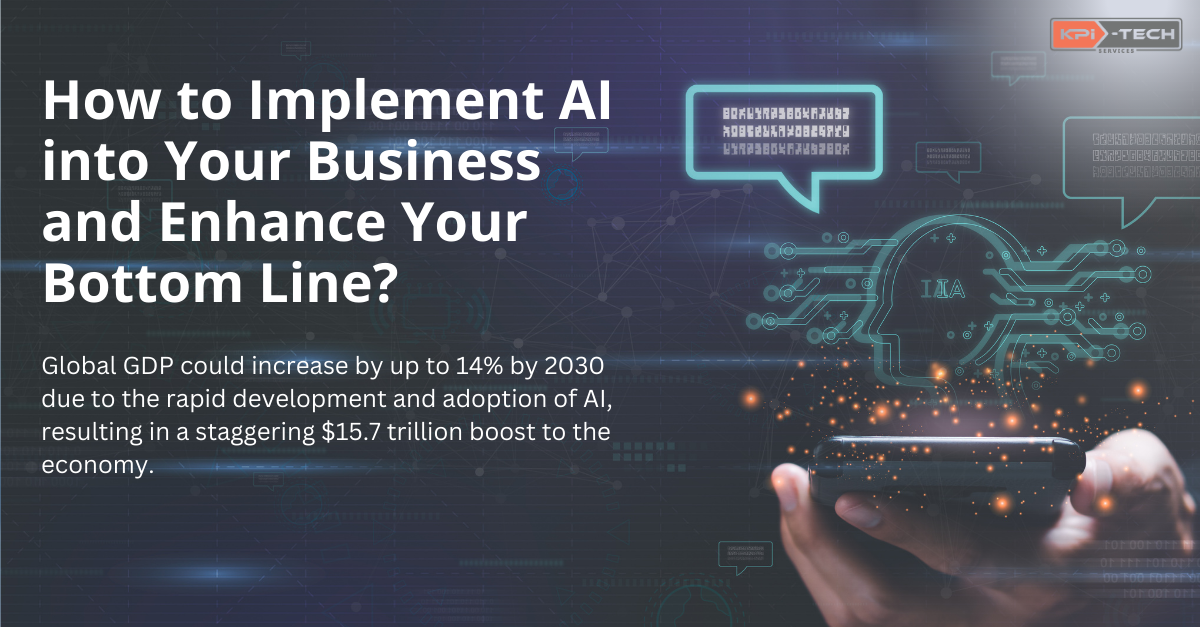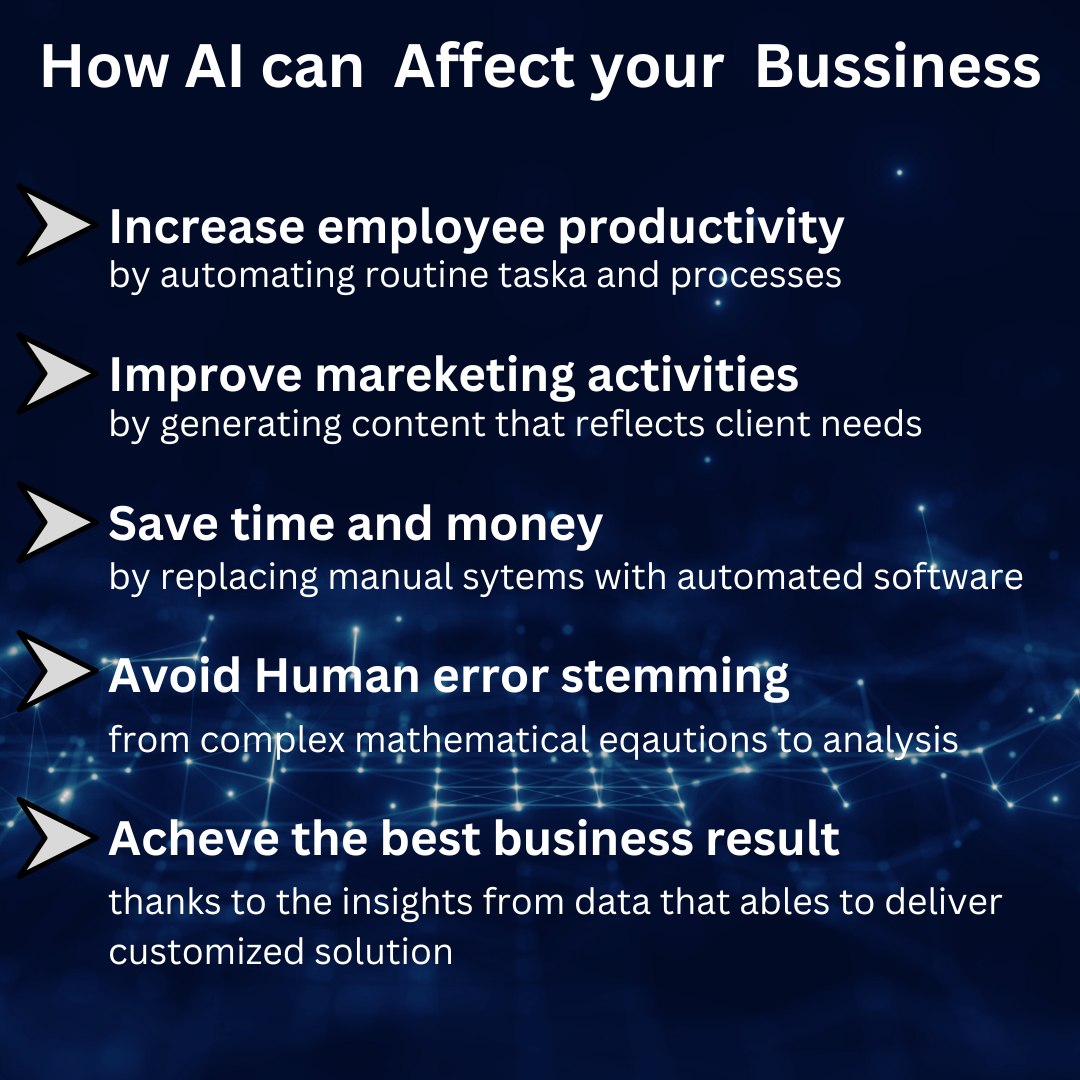
How to Implement AI into Your Business and Enhance Your Bottom Line
Thousands of business leaders are eager to leverage AI but struggle to determine where to begin. Entrepreneurs are particularly interested in learning about business process automation and how to achieve optimal outcomes. However, they often hesitate to take the plunge into unfamiliar territory. If you find yourself in a similar position, this blog post is tailored for you. It provides comprehensive guidance on confidently entering the realm of AI and navigating the path forward for your business
Understand the Differences Between AI and ML
To embark on your journey into utilizing AI, it's essential to grasp the distinction between artificial intelligence (AI) and machine learning (ML). Although these terms are often used interchangeably, they serve different purposes.
- Artificial Intelligence (AI): AI involves programming machines, such as computers or robots, to mimic human thinking and behavior. It encompasses systems capable of intellectual processes like self-learning and problem-solving. AI systems can assimilate, analyze, and utilize factual knowledge to acquire further information. Examples include speech, voice, and image recognition.
- Machine Learning (ML): Coined by Arthur Samuel in 1959, machine learning is a subset of AI. It enables computers to learn from data without explicit programming. ML systems leverage data to make decisions autonomously, without direct human intervention. While ML falls under the umbrella of AI, it specifically focuses on the concept of learning from data to improve performance over time.
The Data Confirms the Significant Role of AI in Business Operations.
According to a report by PwC titled "Bot.Me: A revolutionary partnership," 67% of executives believe that AI will enhance operations by integrating artificial and human intelligence. Additionally, PwC's analysis indicates that the global GDP could increase by up to 14% by 2030 due to the rapid development and adoption of AI, resulting in a staggering $15.7 trillion boost to the economy. This growth is propelled by both increased business productivity and heightened consumer demand for AI-enhanced products that offer better quality and personalized experiences. It is evident that AI is poised to shape the future of business, and companies will inevitably need to adopt it to maintain competitiveness.
How AI Implementation Impacts the Organization?
-
Enhanced Decision Making
AI analyzes vast data in real-time, providing actionable insights for swift, informed decisions across sectors. From optimizing supply chains to predicting customer preferences, AI-driven analytics empower decision-makers to strategize effectively and maintain a competitive edge.
-
Operational Efficiency
AI streamlines processes, automates tasks, and reduces errors, enhancing operational efficiency. From predictive maintenance in manufacturing to intelligent inventory management in retail, AI systems optimize workflows, cut costs, and boost productivity, driving bottom-line results.
RELATED: Practical How Healthcare Automation Can Enhance Efficiency, Interoperability, and Patient Care?
Uses Cases In Healthcare
-
Personalized Customer Experiences
AI algorithms analyze customer behavior to tailor offerings and recommendations. Whether it's personalized marketing or proactive customer support, AI enables businesses to deepen connections with their audience, fostering loyalty in today's hyper-connected world.
-
Innovation Catalyst
AI fuels groundbreaking advancements across industries, from healthcare diagnostics to autonomous vehicles. By pushing boundaries and unlocking new opportunities, AI-enabled systems drive innovation, disrupt traditional models, and pioneer solutions to complex challenge
-
Risk Mitigation and Compliance:
AI plays a crucial role in ensuring regulatory compliance and mitigating risks in industries like finance and healthcare. Through predictive analytics, AI detects anomalies, fraud patterns, and risks in real-time, enabling businesses to proactively safeguard operations and uphold compliance standards.

What are the steps to Implement AI in your Organization?
Effectively implementing AI can present a daunting challenge, necessitating careful strategic planning, sufficient resources, and a dedication to innovation. Here are the 7 steps to know for Integrating AI in your organization and how we can assist you.
-
Identifying Your Business Needs and Objectives
Prior to delving into AI implementation, pinpoint the precise needs and objectives of your organization. What are your existing procedures? In what areas could AI enhance efficiency or provide value to your customers and internal teams? Our team works closely with your organization to identify specific needs and objectives.
We, define the problems you want AI to solve — to do this, try to answer these five questions:
- What outcome(s) do you want to see?
- What are the main obstacles to achieving these outcomes?
- How can AI help your business move towards success?
- How will you measure success?
- What data do you have today, and what additional data do you need?
We help you explore the potential of AI in automating repetitive or labor-intensive tasks, enhancing decision-making processes, boosting accuracy, or elevating customer experiences. Once you've gained clarity on your business objectives, align them with the potential advantages of AI to ensure a successful integration.
-
Choosing the Right AI Solution
With a plethora of AI solutions available, such as chatbots, natural language processing, machine learning, and deep learning, it's crucial to choose the most suitable one for your organization.
With a wealth of experience in AI technologies, we help you navigate the myriad of AI solutions available on the market. Our experts research and evaluate different AI platforms based on factors like scalability, flexibility, and ease of integration. We assess each vendor's reputation and support offerings to ensure compatibility with your existing infrastructure. By selecting the most suitable AI solution for your organization, we lay the foundation for effective AI implementation.
-
Developing a Data Strategy
Data is the lifeblood of AI, and we assist you in developing a comprehensive data strategy to fuel AI initiatives. Prior to AI implementation, it's imperative to establish a robust data strategy since AI relies on substantial data volumes for learning and prediction. Your data strategy should encompass the following:
- Specification of the necessary data types
- Determination of methods for obtaining each data type
- Planning for data collection, storage, and accessibility
- Adherence to regulations governing data privacy
- Assignment of responsibility for data maintenance
Our expertise in data analytics enables us to leverage data effectively, gaining insights and identifying trends that drive business outcomes
-
Building Your AI Team
Assembling a skilled and diverse AI team is essential for successful implementation. We offer support in building your AI team by providing access to talent resources. Whether it's upskilling existing employees, hiring new talent, or partnering with AI consultancies, we help you assemble a team of data scientists, machine learning engineers, data engineers, and domain experts to drive AI initiatives forward.
-
Training Your AI Model
Once the right AI solution is chosen, we collaborate with your team to train AI models effectively. Our experts work closely with data scientists and AI specialists to develop and fine-tune models using comprehensive datasets. By ensuring that your AI model aligns with your business objectives, we lay the groundwork for accurate and reliable results that drive success.
-
Integrating the AI Model into Your Operations
Our team facilitates the seamless integration of AI models into your business operations. We work with key stakeholders to minimize disruptions to existing workflows during the rollout process. Through training and ongoing support, we ensure a smooth transition to AI-driven operations, empowering your organization to realize the full potential of AI.
-
Monitoring and Continuous Improvement
We provide ongoing support in monitoring AI performance and evaluating its impact on your organization. By establishing key performance indicators (KPIs) and analyzing results regularly, we identify opportunities for improvement and refinement. Our commitment to continuous improvement ensures that your AI initiatives evolve in line with your business needs, driving sustained growth and success.
RELATED: How to Achieve Data Interoperability in Healthcare?
In conclusion, at KPi-Tech, we are dedicated to empowering your organization with AI-driven solutions. From identifying business needs and choosing the right AI solution to training models and driving continuous improvement, we provide comprehensive support every step of the way. Partner with us to unlock the transformative power of AI and propel your organization into the future of innovation and success.





